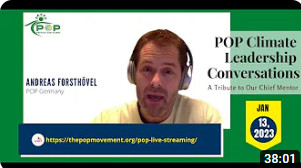
- This event has passed.
POP Climate Leadership Conversation with Andreas Forsthövel, POP Germany
January 13, 2023

“Leadership means being able to fade into the background after a while.”
On January 13, 2023, the POP Movement was pleased to have Andreas Forsthovel frontlining the guest lists for the POP Climate Leadership Conversations 2023. Andreas Forsthovel has been a teacher for over 10 years for students between 10 and 19 years old. He has traveled to various countries with his students for conferences and expositions, from the Future of Energy Expo in Kazakhstan in 2017 to the First World Sustainable Development Forum in Mexico. Andy is interested in traveling, sports, and climate action work. He is married to a wonderful woman and has a beautiful son. Inspired to create an impact for future generations, he created and is the leader of the POP-Movement Germany, which was the focus of the leadership conversation that Ana Hanhausen facilitated.
Dr. Ash Pachauri, POP Senior Mentor invited Andreas to share his thoughts on leadership with the audience. Andreas emphasized the crucial role of teachers in shaping the leaders society needs. He shared his experiences mentoring the POP Germany team on carbon reduction and climate change projects, and spoke about the satisfaction he feels from being a supportive background presence as these projects develop.
Alejandra Fragoso, POP Youth Mentor from Mexico, asked about the origin and initial objective of the POP Movement in Germany. Andreas recounted the story of how it all began with him traveling with a group of students to Kazakhstan to attend the Future Energy Expo and being inspired by a visit from Dr. RK Pachauri, POP Movement’s Founder and Chief Mentor. Five motivated students decided to establish a POP network in Germany, which has now grown to five to six thriving generations while still maintaining connections with the first one.
Ivan Ransom, a POP Sustainability Ambassador and Mentor from Mexico, asked Andreas about the major challenges in leading kids towards sustainability and how they were overcome. He also sought Andreas’ perspective on how to raise young people’s awareness about climate-friendly behavior. Andreas encouraged teachers to take a supportive role in projects and suggested that climate leaders and activists should try new ideas that are worth a short and impactful while. He also shared how they have worked with many institutions to expand the network. On the subject of sensitization, Andreas shared three key points with the audience: using a peer-to-peer approach, creating “aha” moments to elicit a strong response, and thinking about how to integrate these moments into future initiatives.
Philo Magdalene, POP Youth Mentor from India, asked about the projects implemented by POP Germany and their outcomes. Andreas showed the homepage of the POP-Movement Germany’s website and shared about the school’s switch to low-carbon, water-saving copy paper, increased recycling efforts, the installation of a solar-powered smart bench, and the conversion of smart boards, which resulted in a 46% reduction in carbon emissions.
David Barragan, POP Youth Mentor from Mexico, inquired about the key challenges faced by school-related climate projects. Andreas shared about the shortcomings of many people involved in the decision-making of school programs and activities, making it hard to introduce and implement certain projects, the difficulty of maintaining student motivation over a 2-3 year period, and the disruptions caused by COVID-19 in hosting in-person projects. He also talked about the lack of a consistently present audience, which leaves the team with the task of finding new participants more often.
Drishya Pathak, POP Youth Mentor from India, asked about measuring the impact of the POP Germany projects and some important factors that need to be considered for impact measurement. He encouraged the measurement and calculation of impacts based on reduced carbon emissions. He also stressed that some impacts cannot be quantified, like the first generation of POP Germany students incorporating environmental consciousness into their careers, recognizing the number of people who are sensitized and who care about climate and environmental issues, and so on.
The conversation offered great ideas and insights on how one can work with students and create impacts in schools.





